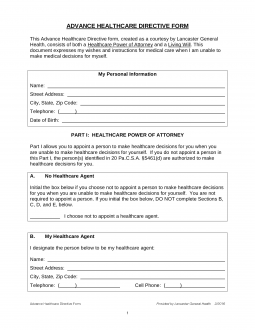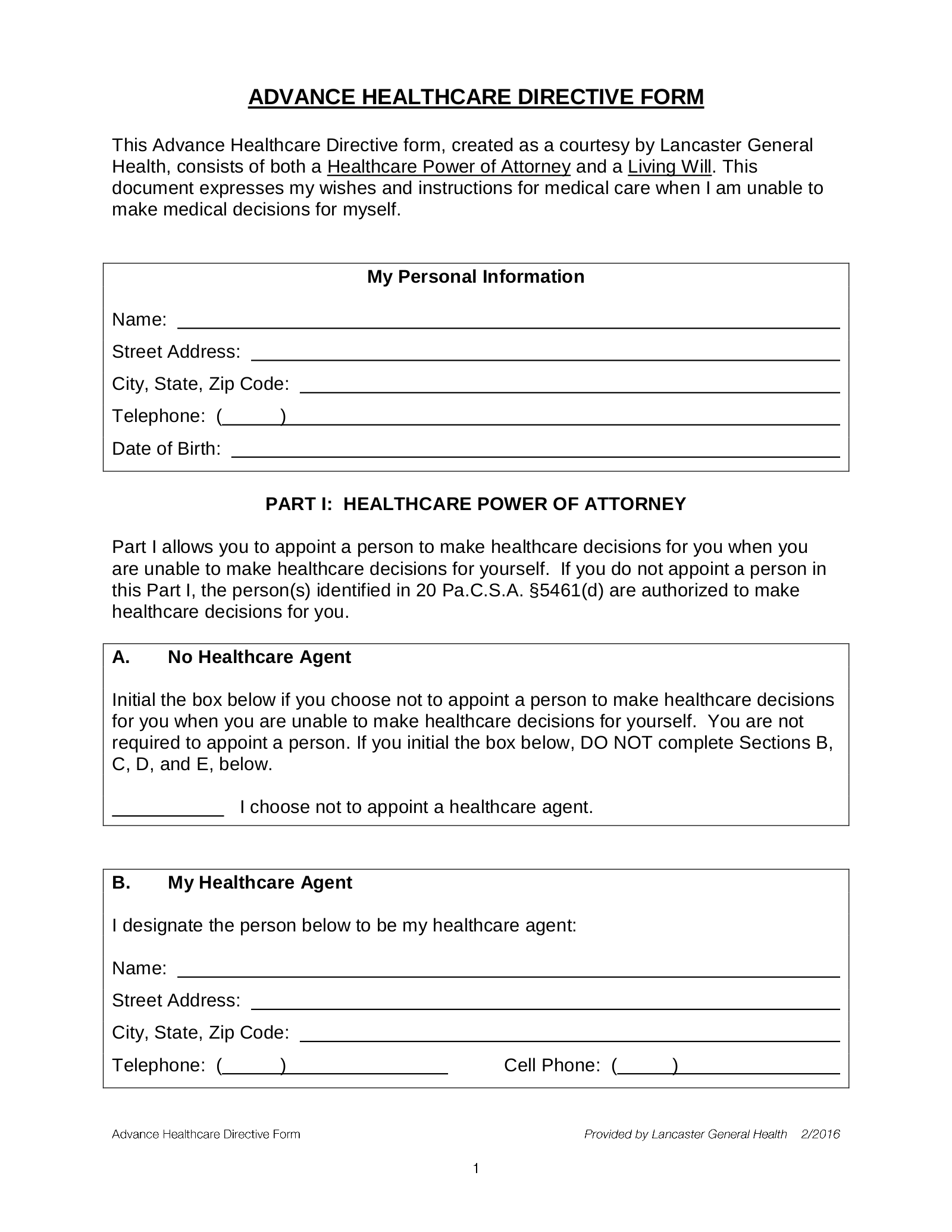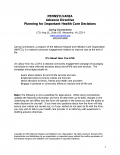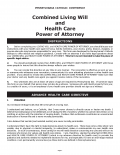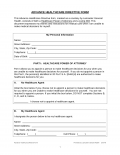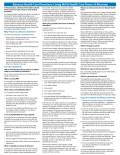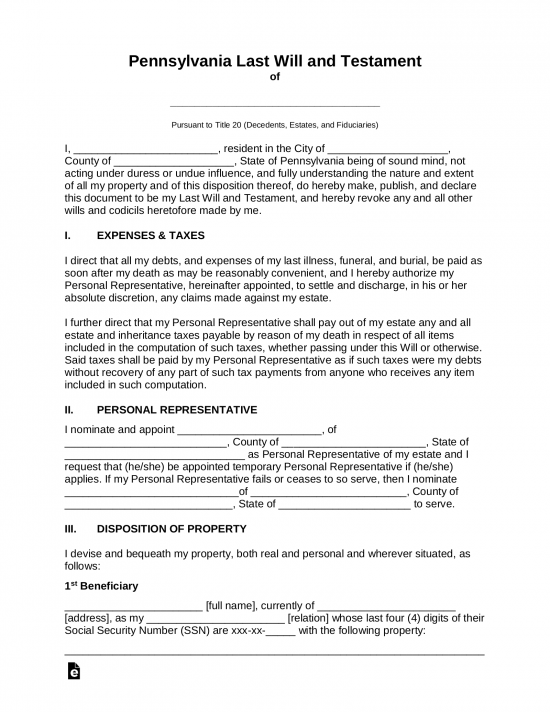Updated July 05, 2023
A Pennsylvania advance directive is a combination of forms that sets out a person’s health care plans and preferences. The form also allows an agent to be selected to carry out the health care preferences in the chance the patient cannot speak for themselves. After completing and signing with two (2) witnesses, the form may be used only after the patient becomes incapacitated.
Advance Directive Includes
Table of Contents |
Laws
Statute – Title 20, Chapter 54 (Health Care)[1][2]
Signing Requirements – Two witnesses.[3]
State Definition -“Advance health care directive.” A health care power of attorney, living will, or a written combination of a health care power of attorney and living will.[4]
Versions (10)
- AARP
- Bryn Mawr Medical Specialists Assoc.
- Catholic Church
- Guthrie
- Lancaster General Health
- Main Line Health
- Mental Health
- Spanish (Español) Version
- Summit Health
- University of Pittsburgh Medical Center
Download: PDF
 Bryn Mawr Medical Specialists Assoc.
Bryn Mawr Medical Specialists Assoc.
Download: PDF
Download: PDF
Download: PDF
Download: PDF
Download: PDF
Download: PDF
Download: PDF
Download: PDF
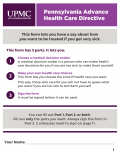 University of Pennsylvania Medical Center
University of Pennsylvania Medical Center
Download: PDF
How to Write
Download: PDF
My Personal Information
(1) Pennsylvania Declarant. The Declarant issuing this directive is the potential Pennsylvania Patient documenting his or her medical treatment preferences for the review of attending Physicians in this state. Report your full name as the Pennsylvania Patient or Declarant behind this document. This paperwork will be referred to by Pennsylvania Medical Professionals seeking to administer your treatment instructions when you cannot communicate or are unconscious.
(2) Address Or Pennsylvania Declarant. Now that you have identified yourself as the Pennsylvania Declarant, document your full address.
(3) Pennsylvania Declarant Telephone Number. Provide your cell phone and home phone number. These should be the telephone numbers that are listed in your medical files.
(4) Date Of Birth.
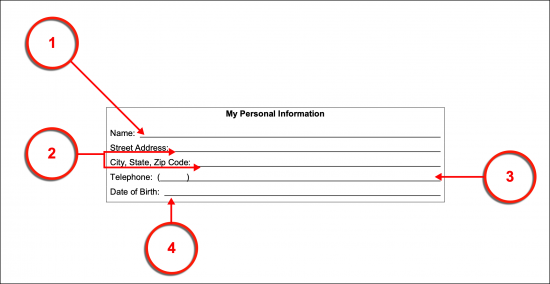
Part I: Health Care Power Of AttorneyDirective
A. No Health Care Agent
(5) Opting Out Of Designating An Agent. This paperwork provides two methods to independently inform Pennsylvania Doctors of your medical treatment instructions. You are not required to fill out both parts although it is recommended that you do. If you have determined that you do not wish to appoint a Healthcare Agent to represent your medical decisions, then initial the statement in Directive A. Naturally, if you initial Directive A, then you may skip Directives B, C, D, and E.

Option B. My Healthcare Agent
(6) Name Of Pennsylvania Healthcare Agent. If you have decided to appoint a Pennsylvania Health Care Agent with the principal power to represent your medical decisions, then locate Directive B. Produce the full name of your Pennsylvania Healthcare Agent to this area.
(7) Address of Pennsylvania Healthcare Agent. It is important that Pennsylvania Healthcare Professionals reviewing this appointment can properly identify your designated Healthcare Agent. To this end, supply his or her full address.
(8) Pennsylvania Healthcare Agent’s Contact Numbers. Produce the Pennsylvania Healthcare Agent’s current telephone and cell phone numbers.
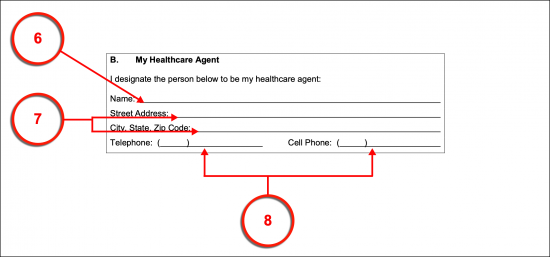
Option C My First Alternate Healthcare Agent
(9) First Alternate Healthcare Agent. The Pennsylvania Healthcare Agent you have appointed may be willing and able to act in this role at the time of this document’s execution however, he or she may be unable or unreachable by the time he or she is called upon by Pennsylvania Health Care Professionals seeking your authorized treatment options. You can name an additional Party in this document that can be considered a Reserve Agent who will be given the principal power to assume the Pennsylvania Healthcare Agent role should it be left vacant.
(10) Address of First Alternate Healthcare Agent.
(11) Phone Numbers of First Healthcare Agent.
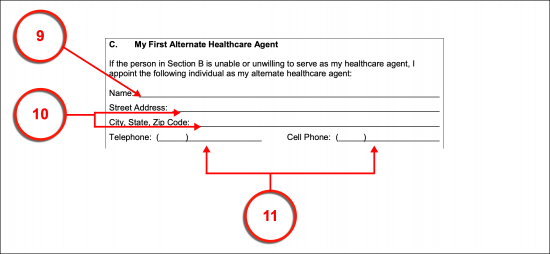
(12) Second Alternate Healthcare Agent Appointment. This section also takes into consideration the availability and ability of your First Alternate Healthcare Agent to represent your medical or treatment interests. If neither your Pennsylvania Healthcare Agent nor First Alternate Agent can represent you, then the Party you name as your Second Alternate Healthcare Agent can be set through this document to use the principal power to act as your Representative with Pennsylvania Doctors seeking your directives.
(13) Address Of Second Pennsylvania Alternate Healthcare Agent.
(14) Second Pennsylvania Alternate Healthcare Agent Telephone Numbers.
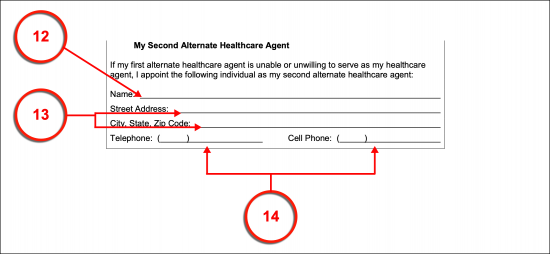
D. Authority Of My Healthcare Agent
(15) Medical Care And Surgical Procedures. The granted principal power to make treatment decisions when you are unable to communicate can have a significant impact on your overall health. A list of such powers is provided for your approval. Any statement granting a power that should not be placed in the control of your Pennsylvania Healthcare Agent can be crossed out to prevent him or her from accessing that type of authority. In the first list item, your Pennsylvania Healthcare Agent will be granted the ability to authorize, deny, or request the withdrawal of medical care and surgeries. Cross out any part of this statement or all of it if you do not want your Healthcare Agent to access such powers.
(16) Nutrition (Food) And Hydration (Water) Instruction. The Pennsylvania Healthcare Agent is authorized to decide when food and water that must be medically delivered through machines should be connected to your system or denied/removed through Statement 2. Leave this statement intact to deliver this principal power to the Pennsylvania Healthcare Agent or remove it (i.e. crossing it out) to restrict such decisions from his or her principal powers.
(17) Medical Facility And Insurance Powers. The authorization required to handle the decisions and paperwork to deal with your Medical Facility admissions/discharges as well as Insurance Companies is granted through Statement 3. While you can strike this item out, it would be wise to make sure you have a Party set up to handle such issues.
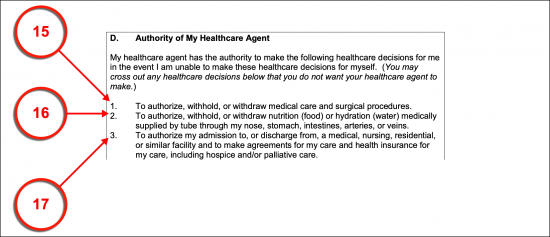
(18) Medical Care Personnel Decisions. The Pennsylvania Physicians, Nurses, Physician’s Assistants, Psychiatrists, and other Medical Personnel can be hired or discharged to provide your treatments as dictated by the Pennsylvania Healthcare Agent through the wording of Statement 4. To grant this power, do not remove or cross out this statement otherwise you may cross it out to restrict the Pennsylvania Healthcare Agent from making such decisions and carrying them out on your behalf.
(19) Enforcing This Directive. Legal action can be obtained by the Pennsylvania Healthcare Agent if he or she must use the courts to enforce your medical directives through Statement 5. This statement can be removed if you do not wish to appoint your Healthcare Agent to this task. Again, if possible, you should make sure that you have a Representative for this task even if this is accomplished through a separate appointment.
(20) Power Over DNR Orders. Statment 5 authorizes your Pennsylvania Healthcare Agent to fill out and sign a Do Not Resuscitate or DNR Order on your behalf. This gives the Agent the ability to prevent CPR from being administered when you experience cardiopulmonary failure provided a licensed Physician agrees with this decision. You may remove this power by crossing out or deleting Statement 6.
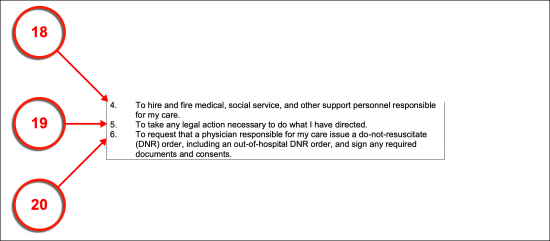
Section E. Additional Authority Of My Healthcare Agent
(21) Severe And Irreversible Brain Damage. This directive will present a specific scenario where some additional definition will be needed to better define your medical preferences. Consider suffering from significant and irreversible damage to your brain (i.e. a neurodegenerative disease, a traumatic injury). While treatment may save your life, the result may directly conflict with what you believe to be a minimal quality of life or be overly burdensome. You may give your Pennsylvania Health Care Agent and Healthcare Providers in this state the authority to take up the directives you set in your living will. To put this instruction in effect, initial “I Agree.” Otherwise, if you do not wish to apply your living will to this scenario (non-fatal but severely debilitating brain damage), initial the “I Disagree” statement.

(22) Your Instructions To Agent. You may use this area to supplement this directive with your own direct instructions to the Pennsylvania Healthcare Agent at your discretion.

Part II Living Will
A. Aggressive Medical Care
(23) Prevent Aggressive Medical Care. Once you reach the end-stage of an advance medical condition that will, inevitably, result in death within a short period of time and/or are diagnosed as permanently unconscious, Pennsylvania Medical Staff will perform medical interventions to keep you alive especially when a life-threatening traumatic event such as cardiopulmonary failure occurs. You can instruct Pennsylvania Physicians to abstain from providing any such interventions especially if they are invasive or will not have any goal other than extending life by initialing the first statement in Directive A. When you initial this statement, it will indicate that you only approve of health care aimed at keeping you comfortable and maintaining hygiene so that a natural death will occur.
(24) Approval For Medical Interventions. If you wish your life extended even through the use of aggressive or invasive treatments and regardless of the burden it places on your health and comfort, then you must initial the second statement of Directive A to inform Pennsylvania Physicians of this request for life-prolonging treatment and medical interventions.
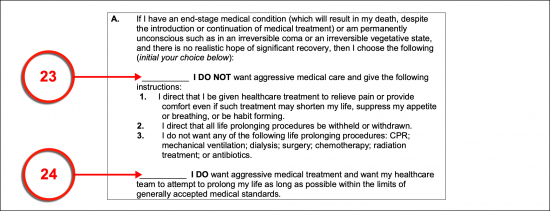
B. Additional Information
(25) Tube Feeding Directive. If you have determined that you will authorize tube insertions when you can no longer intake food or an I.V. for liquids at a time when you are unconscious (permanently) or entering the end-stage of a fatal illness, then initial the first item in Section B. Initialing the second statement will inform Pennsylvania Health Care Providers that you do not wish to receive your food and water through a machine and tube under any circumstances unless you are awake to provide consent at the time.

(26) Your Pennsylvania Healthcare Agent Vs Your Living Will. There may be a time when treatment options you have not considered become available while you are unconscious. This can place the directives of your living will in direct contradiction with your Pennsylvania Healthcare Agent’s desire to carry out your preferences. You can either insist that your Pennsylvania Healthcare Agent must follow the directions in your living will by initialing the second item of Directive 2 or you may set your Pennsylvania Healthcare Agent’s treatment decisions to take precedence over your living will by initialing the second statement.

(27) Organ Donation Directive. The final directive in this section enables you to authorize anatomical gifts made after death or allows you to explicitly state that you do not wish to make any organ donations.

Part III. Signature
(28) Signature Date. Review this paperwork. Once you confirm the above document presents the medical directives that you wish Pennsylvania Health Care Providers to follow, you must sign it. Furnish the calendar date for display on the day you deliver your signature to this document.
(29) Signature Requirement. The State of Pennsylvania will seek a verifiable signature from you, the Principal and the Declarant issuing it. To this end, as two Witnesses watch, sign your full name after you have documented the current date.

(30) Witness Signatures. A signature verifying your own must be provided by both Pennsylvania Witnesses attending your signing.
(31) Witness Printed Name. After signing his or her name, both Pennsylvania Witnesses must print his or her name.

Pennsylvania Orders For Life-Sustaining Treatment (POLST)
(32) Pennsylvania Patient. A Pennsylvania Orders For Life-Sustaining Treatment, otherwise known as the POLST, can be filled out with a licensed Medical Professional in this state. This process begins with a report of the full name of the Pennsylvania Principal or Patient issuing it along with his or her date of birth. Present this information to the top of this page.

Cardiopulmonary Resuscitation (CPR)
(33) CPR Or DNR Directive. The Patient’s decision to accept cardiopulmonary resuscitative efforts in the State of Pennsylvania can be provided to Medical Professionals by selecting the first directive statement in Section A. If this is not an accurate representation of the instructions you wish to deliver then direct your attention to the second option. Select this statement if you wish to inform Pennsylvania Medical Professionals that you (the Patient) do not want to be resuscitated from cardiopulmonary failure. This will mean that Pennsylvania Doctors will not attempt to restart your heart or lungs when either or both cease to function. Choose either “CPR/Attempt Resuscitation” or the “DNR/Do Not Attempt Resuscitation” to define your directions to Pennsylvania First Responders and Physicians when you are incapacitated by a failure of your hearts or lungs.

Medical Interventions
(34) Comfort Measure Only. In addition to cardiopulmonary failure, you can address conditions that incapacitate you and threaten life without stopping your heart or lungs. If you do not wish to have your life maintained by invasive medical procedures because you have a condition that will result in death regardless of treatment, then present your direction on treatment to focus on “Comfort Measures Only” by marking the first statement.
(35) Limited Additional Interventions. The second statement in Section B is useful if you wish to receive life-sustaining treatment when death is inevitable but wish to prevent the use of invasive medical procedures such as intubation or surgery. This also allows you to define a specific trial period for treatments that you believe may help you regain consciousness. Select this “Limited Additional Interventions” option to define this as your preferred level of treatment.
(36) Full Treatment. You can set your medical orders to authorize all treatments at the disposal of Pennsylvania Medical Providers that can preserve or even sustain your life to be used when needed by marking the third checkbox of Section B.
(37) Additional Orders.
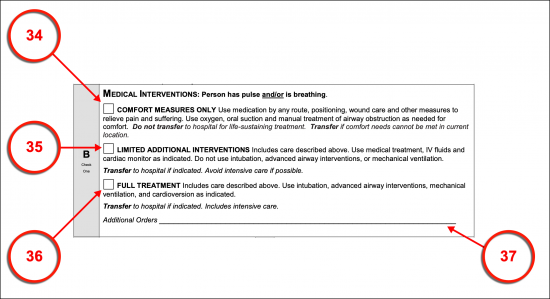
Antibiotics
(38) No Antibiotics. The decision to use antibiotics to treat an infection or even to relieve symptoms of your medical condition should also be addressed. As the Pennsylvania Patient, you should take a moment to speak to the Medical Professional working on this document to discuss how various antibiotics will effect you. At the end of such a consultation, determine whether you wish to deny the use of antibiotics when you have been incapacitated, diagnosed as permanently unconscious, or in the end stage of an advanced disease or fatal medical condition. If so, then select the first statement on this subject.
(39) Limitation On Antibiotic Use. Select the second statement to require that an evaluation of your condition, directives and the effects of an antibiotic take place before it can be administered. This section also provides an “Additional Orders” area where you may discuss your instructions or limitations that should be applied when Pennsylvania Physicians determine that antibiotics should be administered.
(40) Use Antibiotics. To convey full authorization for the use of antibiotics in your medical treatment to Pennsylvania Medical Staff, select the final statement.
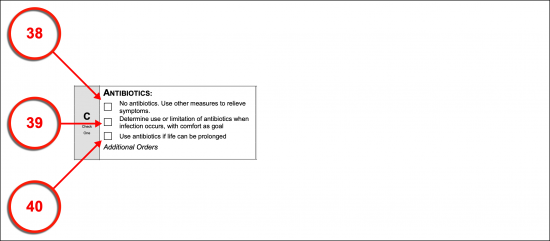
Artificially Administered Hydration/Nutrition
(41) No Hydration/Nutrition Through Tube. Your body’s nutrition and fluid levels will drop dangerously while you are permanently incapacitated or unconscious. Often, when in this condition, there is a prevalent danger or hazard that a hand-assisted feeding will result in choking. Thus, Pennsylvania Medical Staff will wish to obtain the approval to either ensure your hydration and nutrition remain healthy or your approval to withdraw/deny all medically delivered hydration/nutrition (i.e. a surgically inserted tube). Section D will display your request that medical technology not be used to deliver fluids and nourishment when you select the appropriate statement.
(42) Trial Period. If you wish to receive hydration and nourishment through medical technology when necessary but only for a specific period of time, in the hopes that you will regain consciousness, then select the second statement. Use the area labeled “Additional Orders” to deliver facts such as the circumstances for your trial period, how long it should be, or any other instruction you may have on the topic of artificial hydration and nutrition.
(43) Long-Term Authorization. If you wish to have your hydration and nutrition levels monitored and maintained, even if by medical technology, then select the third statement.
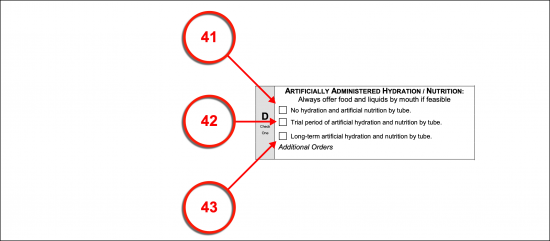
Summary Of Goals, Medical Condition, And Signatures
(44) Party Of Discussion. Review the list of Entities in Section E. The individual that has consulted with the Pennsylvania Medical Professional regarding the Patient’s care should be identified by type even it is the Patient. Select the best description of the Party discussing the Patient’s needs with Pennsylvania Medical Professional from the list provided.
(45) Patient Goals/Medical Condition. In addition to the information provided above, any other topic that the Patient and Pennsylvania Medical Professional agree should be delivered as a formal medical order for treatment must be documented in the space provided. If more room is needed to present every medical order that applies to the Pennsylvania Patient, then make sure this information is presented on an attachment that is dated, signed, and named in this section.

(46) Physician/PA/CRNP Printed Name. The full name (including title) of the Pennsylvania Physician, Physician’sPhsycian’s Assistant, or Registered Nurse completing this form with the Patient should be presented in print.
(47) Physician/PA/CRNP Phone Number.
(48) Physician/PA/CRNP Signature. The signature of the Pennsylvania Medical Professional (Physician, Physician’s Assistant, Nurse Practioner) approving this POLST must be provided.
(49) Date.
(50) Signature Of Patient Or Surrogate. The Pennsylvania Patient or the Authorized Surrogate (i.e. Healthcare Agent) must sign this document to place it in effect.
(51) Printed Name. The full printed name of the Signature Party (Patient or Representative) must be displayed.
(53) Relationship (Write “Self” If Patient). Identify yourself as the Patient by writing in the word “Self” or identify yourself as a legally appointed Representative of the Patient by documenting how you are related to him or her.
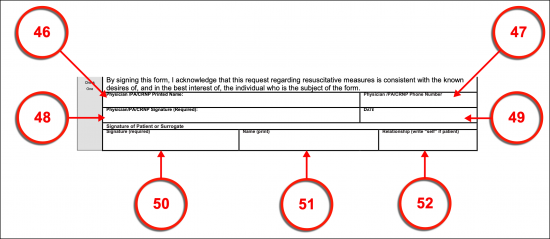
(54) Surrogate. If the Pennsylvania Patient has a Healthcare Representative or other Surrogate appointed to carry out his or her medical directives then produce the name of this Party in the “Other Contact” area.
(55) Relationship. Define the Relationship held between the Pennsylvania Healthcare Surrogate and the Patient.
(56) Phone. Dispense the Pennsylvania Healthcare Surrogate or Representative’s telephone number.
(57) Health Care Professional Preparing Form. The Party who has prepared this document for signing must self-identify as the Pennsylvania POLST Preparer.
(58) Preparer Title. The professional title held by the Preparer must be documented.
(59) Phone Number. Deliver the telephone number where the POLST Preparer can be reached.
(60) Date Prepared. The date when this document has been fully prepared and ready for signing should be established.
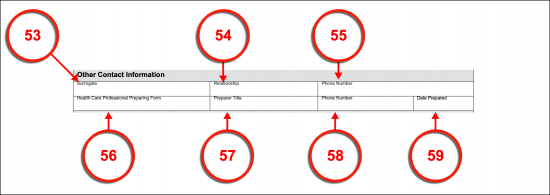
Related Forms
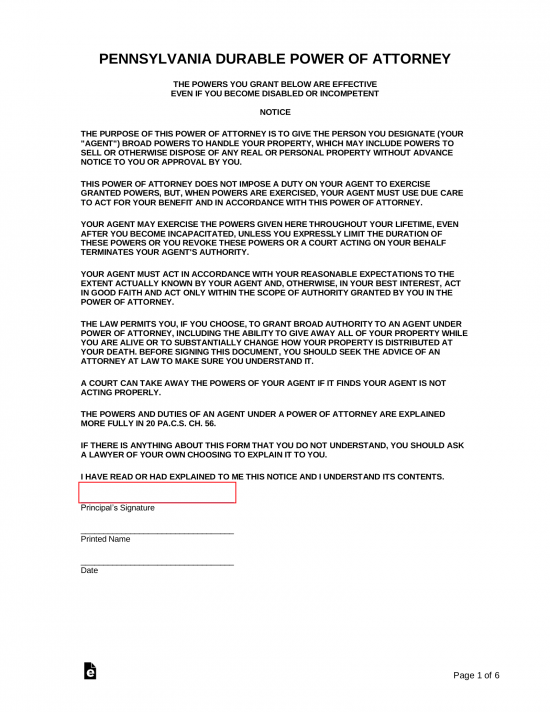 Durable (Financial) Power of Attorney
Durable (Financial) Power of Attorney
Download: PDF, MS Word, OpenDocument
Download: PDF, MS Word, OpenDocument

